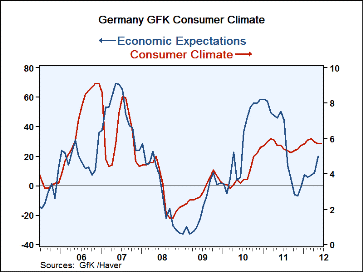 Global| May 25 2012
Global| May 25 2012German Consumers Hang in there Despite Zone Troubles
Summary
Germany’s economic climate held steady in June despite troubles in the surrounding Euro-Area and a controversial change of leadership in France. Despite these distractions and risks German consumers continue to see mild inflation and [...]
 Germany’s economic climate held steady in June despite troubles in the surrounding Euro-Area and a controversial
change of leadership in France. Despite these distractions and risks German consumers continue to see mild
inflation and continuing growth, holding their confidence reading steady on the month
Germany’s economic climate held steady in June despite troubles in the surrounding Euro-Area and a controversial
change of leadership in France. Despite these distractions and risks German consumers continue to see mild
inflation and continuing growth, holding their confidence reading steady on the month
Compare the German reading to the readings for Italy, France and the UK. We show the count percentiles (also called queue percentiles) which place the recent observation in the ordered percentile queue for each metric allowing comparison of different surveys. Germany’s climate survey is in the 77% of its queue or the top 23%. Italy’s measure (that lags one month) is at its lowest reading in the period, the UK GfK survey is in the bottom 16 percentile (it lags two months) and France’s Index is near the midpoint of its range at the 50.5 percentile of its one-month lagged range
While the PMI reports issued on Thursday showed weakening across EMU and a very weak reading for Germany (bottom 9%) if its MFG PMI range) the consumer gauges show a completely different picture, at least for Germany. Europe is having difficulties but the degrees of difficulty be suffered in the various EMU member countries appear to be quite varied. Germany appears to be much more immune for the problems in the Zone than the PMI gauges suggest and it remains in a world of its own as far as consumer attitudes are concerned.
| Germany Consumer Climate Survey GFK | Other EU Members | ||||||
|---|---|---|---|---|---|---|---|
| Climate | Expectations | Propensity | Consumer/Household Confidence | ||||
| Economic | Income | to Buy | Italy:ISAE | France:INSEE | UK:GFK | ||
| Jun-12 | 5.7 | -- | -- | -- | -- | -- | -- |
| May-12 | 5.7 | 19.6 | 32.0 | 32.0 | 86.5 | 90.0 | #N/A |
| Apr-12 | 5.8 | 8.5 | 33.0 | 27.6 | 88.8 | 89.0 | -31.0 |
| Mar-12 | 6.0 | 7.2 | 34.3 | 38.6 | 96.1 | 87.0 | -31.0 |
| Feb-12 | 5.9 | 5.9 | 41.3 | 39.2 | 93.8 | 82.0 | -29.0 |
| Levels | Current | Lagged One Month | 2Mo Lag | ||||
| Average | 4.7 | 12.2 | 8.3 | 12.4 | 100.6 | 90.1 | -16.6 |
| Max | 9.1 | 69.5 | 45.2 | 64.4 | 108.3 | 107.0 | 1.0 |
| Min | 1.5 | -32.9 | -20.5 | -28.6 | 86.5 | 78.0 | -39.0 |
| % range | 55.3% | 51.3% | 79.9% | 65.2% | 0.0% | 41.4% | 20.0% |
| Count% | 77.7% | 62.8% | 77.7% | 75.5% | 0.0% | 50.5% | 16.1% |
| % Range is current reading as a percentile of Hi/Low range | |||||||
| Count % is current reading ranked as a %-tile among all readings | |||||||
| GFK survey dates from January 2002 | |||||||
Robert Brusca
AuthorMore in Author Profile »Robert A. Brusca is Chief Economist of Fact and Opinion Economics, a consulting firm he founded in Manhattan. He has been an economist on Wall Street for over 25 years. He has visited central banking and large institutional clients in over 30 countries in his career as an economist. Mr. Brusca was a Divisional Research Chief at the Federal Reserve Bank of NY (Chief of the International Financial markets Division), a Fed Watcher at Irving Trust and Chief Economist at Nikko Securities International. He is widely quoted and appears in various media. Mr. Brusca holds an MA and Ph.D. in economics from Michigan State University and a BA in Economics from the University of Michigan. His research pursues his strong interests in non aligned policy economics as well as international economics. FAO Economics’ research targets investors to assist them in making better investment decisions in stocks, bonds and in a variety of international assets. The company does not manage money and has no conflicts in giving economic advice.
More Economy in Brief
 Global| Feb 05 2026
Global| Feb 05 2026Charts of the Week: Balanced Policy, Resilient Data and AI Narratives
by:Andrew Cates






